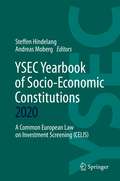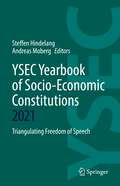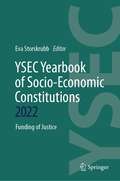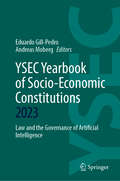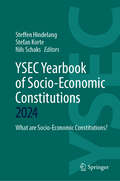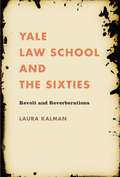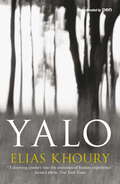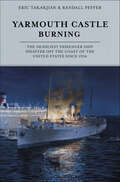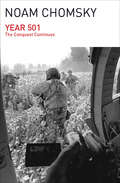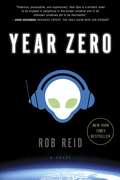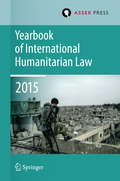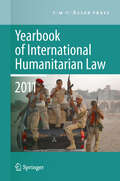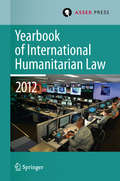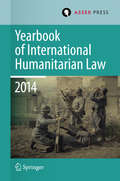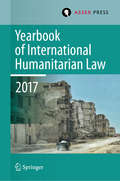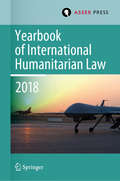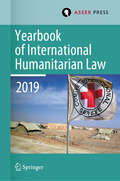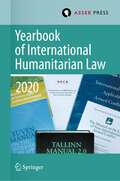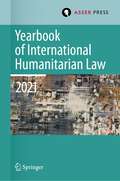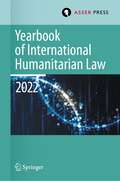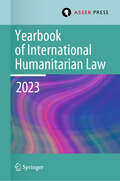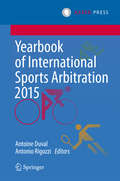- Table View
- List View
YSEC Yearbook of Socio-Economic Constitutions 2020: A Common European Law on Investment Screening (CELIS) (YSEC Yearbook of Socio-Economic Constitutions #2020)
by Steffen Hindelang Andreas MobergThis book presents the very first, interdisciplinarily grounded, comprehensive appraisal of a future “Common European Law on Investment Screening”. Thereby, it provides a foundation for a European administrative law framework for investment screening by setting out viable solutions and evaluating their pros and cons. Daimler, the harbour terminal in Zeebrugge, or Saxo Bank are only three recent examples of controversially discussed company takeovers in Europe. The “elephant in the room” is China and its “Belt and Road Initiative”. The political will in Europe is growing to more actively control investments flowing into the EU. The current regulatory initiatives raise several fundamental, constitutional and regulatory issues. Surprisingly, they have not been addressed in any depth so far. The book takes stock of the current rather fragmented regulatory approaches and combines contributions from leading international academics, practitioners, and policy makers in their respective fields. Due to the volume’s comprehensive approach, it is expected to influence the broader debate on the EU’s upcoming regulation of this matter. The book is addressed to participants from academia as well as to representatives from government, business, and civil society.
YSEC Yearbook of Socio-Economic Constitutions 2021: Triangulating Freedom of Speech (YSEC Yearbook of Socio-Economic Constitutions #2021)
by Steffen Hindelang Andreas MobergThis volume addresses contemporary challenges, enabled by modern technology, that concern upholding freedom of speech where it conflicts with social rights, such as respect for private and family life, and with economic rights, such as the freedom to conduct business or the right to free movement. In today’s networked world, technological shifts happen faster than most people even realize. Some of these shifts have made us all potentially powerful: media powerful. We used to sit in silence in front of newspapers and TV screens, and the world was explained to us by just a few sources. Today, thanks to the Internet, social media, and Web 2.0, we can not only share our own thoughts with everyone in a more self-determined way, but we can also take part in public debate and even co-shape it ourselves. Of course, the Internet is not a counter-design to the communication (power) structures of the past. Gains in communicative self-determination are threatened due to algorithmisation, platformisation, and value extraction from self-created private markets. At the same time, the empowerment of the individual challenges the old “grand speakers” who are suddenly detecting “fake news”, echo chambers, and filter bubbles everywhere on the Internet. Internet-based communication allegedly hinders us from the “one truth”; as if newspaper hoaxes, propaganda, and narrow-mindedness were an invention of the Internet. The current heated debate over “fake news”, copyright, and “upload filters” shows that we are unsure of how to deal with the newer and more complex phenomena of Internet-based speech. This is due in no small part to the fact that an important benchmark – our constitutional compass – is still firmly rooted in the past. Constitutions change far more slowly than technologies. Societal changes can drive constitutional changes; but what about normative content control? Today, there are already demands for “old-school clarity”: truth filters on social media platforms, horrendous sums of liability for platforms that encourage (overly)thorough cleaning up. However, it is equally true that private individuals “regulate”: they decide what is found on the Internet and who may post on a given platform. Accounting for all interests at play and striking a “fair” balance that avoids both a public and private over- and under-regulation is a complex matter. The authors of this volume not only provide reflections in their highly topical contributions, but also share their understanding of what constitutes a fair balance within the larger frame of freedom of speech in a digital age.
YSEC Yearbook of Socio-Economic Constitutions 2022: Funding of Justice (YSEC Yearbook of Socio-Economic Constitutions #2022)
by Eva StorskrubbFunding of justice has significant consequences for the enforcement of rights and impacts directly on access to justice and the right to a fair trial as constitutional rights. Access to justice in turn essentially impacts on the effective enjoyment of any other constitutional right, since having the actual means to access a court in case of a potential breach strengthens that right. Public funding, such as legal aid, has come under pressure due to the reality of financial austerity measures and the tightening public budgets in many countries. This has contributed to privatization and marketisation of funding in ever more jurisdictions. Private forms of funding include inter alia litigation insurance, third-party litigation finance and crowdfunding, as well as different forms of assigning or selling claims. As public funding is in decline and as market liberalization in the field of justice increases, crucial questions related to the rule of law, access to justice and social and economic development, in the intersection between states, citizens and business are raised. For example, potential questions of conflict of interest and how to ensure a basic level of equality of access to funding, whilst at the same time protecting market freedom. Some of the contributions in the volume deal with the consequences of privatization of funding of justice on access to justice from a general, principled and theoretical perspective. Other contributions deal with specific regulatory developments or issues at the EU level, alternatively at the local level in specific jurisdictions. Further contributions deal with crucial issues of funding of justice in environmental matters, that are increasingly relevant and topical in practice.
YSEC Yearbook of Socio-Economic Constitutions 2023: Law and the Governance of Artificial Intelligence (YSEC Yearbook of Socio-Economic Constitutions #2023)
by Eduardo Gill-Pedro Andreas MobergArtificial intelligence (AI) has the potential to radically transform our society. It may lead to a massive increase in the capabilities of humankind and allow us to address some of our most intractable challenges. It may also entail profound disruption to structures and processes that have sustained our society over centuries. These developments present a unique challenge to the socio-economic constitutional arrangements which govern our world at national, regional and international level. The deployment of increasingly powerful AI systems, able to function with increasing degree of autonomy, has led to concerns over loss of human control of important societal processes, over the disruption of existing economic, social and legal relationships, and over the empowerment of some societal actors at the expense of others, together with the entrenchment of situations of domination or discrimination. It has also made increasingly clear how tremendous the potential benefits, that these technologies may bring, are to those who successfully develop and deploy them. There is therefore great pressure on governments, international institutions, public authorities, civil society organisations, industry bodies and individual firms to introduce or adapt mechanisms and structures that will avoid the potentially negative outcomes of AI and achieve the positive ones. These mechanisms and structures, which have been given the umbrella term ‘AI governance’, cover a wide range of approaches, from individual firms introducing ethical principles which they volunteer to abide by, to the European Union legislating an AI Act, which will prohibit certain types of AI applications and impose binding obligations on AI developers and deployers. The fast pace of innovation in the development of AI technologies is mirrored by the fast pace of development of the emerging field of AI governance, where traditional legislation by public bodies is complemented with more innovative approaches, such ashybrid and adaptive governance, ethical alignment, governance by design and the creation of regulatory sandboxes. The chapter “AI and Sensitive Personal Data Under the Law Enforcement Directive: Between Operational Efficiency and Legal Necessity” is available open access under a Creative Commons Attribution 4.0 International License via link.springer.com.
YSEC Yearbook of Socio-Economic Constitutions 2024: What are Socio-Economic Constitutions? (YSEC Yearbook of Socio-Economic Constitutions #2024)
by Steffen Hindelang Stefan Korte Nils SchaksThe fifth volume of the Yearbook of Socio-Economic Constitutions (YSEC Yearbook) offers an in-depth exploration of socio-economic constitutionalism, a field gaining rapidly in importance as global economies shift. Established equilibria between economic freedoms and socio-political interests are under pressure. This volume addresses contemporary issues, illustrating the balances between constitutional principles, economic goals, and socio-political values. Bridging theory and practice, it begins with foundational theories, advances through national applications, and concludes with global challenges. At its core is the socio-economic constitution, with authors examining how different jurisdictions interpret and apply this concept. The initial chapters lay a theoretical foundation. The volume then explores national approaches (Belgium, France, Germany, South Africa, South Korea, Sweden, Switzerland and also the EU), showcasing how countries adapt socio-economic constitutional principles to their historical, cultural, and legal contexts. The volume explores then the interplay of different constitutional interests at EU and international level, e.g., the EU&’s balancing act between sustainability and consumer welfare when it comes to competition law or foreign investment screening at the intersection of economic security and national sovereignty. By moving from theory to national models and global issues, this YSEC volume offers a comprehensive contemporary view of socio-economic constitutionalism. It illustrates how constitutions are evolving to address today&’s challenges, blending economic, social, and environmental concerns within a constitutional framework. This work is essential for readers seeking to understand how socio-economic constitutional principles can bridge theory and practice in today&’s world.
Yakuza Moon: Memoirs of a Gangster's Daughter
by Louise Heal Shoko TendoYakuza Moon is the shocking, yet intensely moving memoir of 37-yearold Shoko Tendo, who grew up the daughter of a yakuza boss. Tendo lived her life in luxury until the age of six, when her father was sent to prison, and her family fell into terrible debt. Bullied by classmates who called her "the yakuza girl," and terrorized at home by a father who became a drunken, violent monster after his release from prison, Tendo rebelled. A regular visitor to nightclubs at the age of 12, she soon became a drug addict and a member of a girl gang. By the age of 15 she found herself sentenced to eight months in a juvenile detention center.Adulthood brought big bucks and glamour when Tendo started working as a bar hostess during Japan’s booming bubble economy of the nineteen- eighties. But among her many rich and loyal patrons there were also abusive clients, one of whom beat her so badly that her face was left permanently scarred. When her mother died, Tendo plunged into such a deep depression that she tried to commit suicide twice.Tendo takes us through the bad times with warmth and candor, and gives a moving and inspiring account of how she overcame a lifetime of discrimination and hardship. Getting tattooed, from the base of her neck to the tips of her toes, with a design centered on a geisha with a dagger in her mouth, was an act that empowered her to start making changes in her life. She quit her job as a hostess. On her last day at the bar she looked up at the full moon, a sight she never forgot. The moon became a symbol of her struggle to become whole, and the title of the book she wrote as an epitaph for herself and her family.
Yale Law School and the Sixties
by Laura KalmanThe development of the modern Yale Law School is deeply intertwined with the story of a group of students in the 1960s who worked to unlock democratic visions of law and social change that they associated with Yale's past and with the social climate in which they lived. During a charged moment in the history of the United States, activists challenged senior professors, and the resulting clash pitted young against old in a very human story. By demanding changes in admissions, curriculum, grading, and law practice, Laura Kalman argues, these students transformed Yale Law School and the future of American legal education.Inspired by Yale's legal realists of the 1930s, Yale law students between 1967 and 1970 spawned a movement that celebrated participatory democracy, black power, feminism, and the counterculture. After these students left, the repercussions hobbled the school for years. Senior law professors decided against retaining six junior scholars who had witnessed their conflict with the students in the early 1970s, shifted the school's academic focus from sociology to economics, and steered clear of critical legal studies. Ironically, explains Kalman, students of the 1960s helped to create a culture of timidity until an imaginative dean in the 1980s tapped into and domesticated the spirit of the sixties, helping to make Yale's current celebrity possible.
Yalo
by Elias KhouryYalo was a soldier on one of the many sides in Lebanon's sectarian civil war, before becoming a deserter and a thief, a nightwatchman in Paris, an arms smuggler, and then a rapist. And then he falls in love with his victim - who turns him in to the police. This novel is a modern Thousand and One Nights, a series of confessions extracted under torture, a recitation of all of his memories, all his sorrows, all his guilt - and of the other crimes his interrogators have him confess to. Beirut and the legacy of the wars of the Middle East are the texture of Elias Khoury's extraordinary literary achievement.
Yarmouth Castle Burning: The Deadliest Passenger Ship Disaster off the Coast of the United States Since 1934
by Randall Peffer Eric TakakjianThe horrific burning and sinking of the Castle was caused by negligent, indecisive, and even borderline criminal behavior on the part of her captain, crew, and by the management of the operating cruise line
Year 501: The Conquest Continues (Chomsky Perspectives Ser. #Vol. 63)
by Noam Chomsky"The great work of subjugation and conquest" has changed little over the years. Analyzing Haiti, Latin America, Cuba, Indonesia, and even packets of the Third World developing in the United States. Noam Chomsky draws parallels between the genocide of colonial times and the murder and exploitation associated with modern-day imperialism.
Year Zero: A Novel
by Rob ReidAn alien advance party was suddenly nosing around my planet. Worse, they were lawyering up. . . . In the hilarious tradition of The Hitchhiker's Guide to the Galaxy, Rob Reid takes you on a headlong journey through the outer reaches of the universe--and the inner workings of our absurdly dysfunctional music industry. Low-level entertainment lawyer Nick Carter thinks it's a prank, not an alien encounter, when a redheaded mullah and a curvaceous nun show up at his office. But Frampton and Carly are highly advanced (if bumbling) extraterrestrials. And boy, do they have news. The entire cosmos, they tell him, has been hopelessly hooked on humanity's music ever since "Year Zero" (1977 to us), when American pop songs first reached alien ears. This addiction has driven a vast intergalactic society to commit the biggest copyright violation since the Big Bang. The resulting fines and penalties have bankrupted the whole universe. We humans suddenly own everything--and the aliens are not amused. Nick Carter has just been tapped to clean up this mess before things get ugly, and he's an unlikely galaxy-hopping hero: He's scared of heights. He's also about to be fired. And he happens to have the same name as a Backstreet Boy. But he does know a thing or two about copyright law. And he's packing a couple of other pencil-pushing superpowers that could come in handy. Soon he's on the run from a sinister parrot and a highly combustible vacuum cleaner. With Carly and Frampton as his guides, Nick now has forty-eight hours to save humanity, while hopefully wowing the hot girl who lives down the hall from him."Hilarious, provocative, and supersmart, Year Zero is a brilliant novel to be enjoyed in perpetuity in the known universe and in all unknown universes yet to be discovered."--John Hodgman, resident expert, The Daily Show with Jon StewartFrom the Hardcover edition.
Yearbook of International Humanitarian Law Volume 18, 2015 (Yearbook of International Humanitarian Law #18)
by Terry D. GillThe general theme of this volume is contemporary armed conflicts and their implications for international humanitarian law. It is elaborated upon in several chapters, dealing with a variety of topics related to, among other things, the situations in Libya, Transnistria, Mexico, Syria/Iraq (Islamic State) and Israel/Gaza. Besides these chapters that can be connected to the general theme, this volume also contains a chapter dedicated to an international criminal law topic (duress), as well as a Year in Review, describing the most important events and legal developments that took place in 2015. The Yearbook of International Humanitarian Law is the world’s only annual publication devoted to the study of the laws governing armed conflict. It provides a truly international forum for high-quality, peer-reviewed academic articles focusing on this crucial branch of international law. Distinguished by contemporary relevance, the Yearbook of International Humanitarian Law bridges the gap between theory and practice and serves as a useful reference tool for scholars, practitioners, military personnel, civil servants, diplomats, human rights workers and students.
Yearbook of International Humanitarian Law 2011 - Volume 14
by Michael N. Schmitt Louise ArimatsuThe Yearbook of International Humanitarian Law is the world's only annual publication devoted to the study of the laws governing armed conflict. It provides a truly international forum for high-quality, peer-reviewed academic articles focusing on this crucial branch of international law. Distinguished by contemporary relevance, the Yearbook of International Humanitarian Law bridges the gap between theory and practice and serves as a useful reference tool for scholars, practitioners, military personnel, civil servants, diplomats, human rights workers and students.
Yearbook of International Humanitarian Law Volume 15, 2012
by Christophe Paulussen Terry D. Gill Robin Geiß Robert Heinsch Tim Mccormack Jessica Dorsey'Child Soldiers and the Lubanga Case' and 'The Tallinn Manual on the International Law Applicable to Cyber Warfare' are the two central themes of this volume. Each of these timely topics is addressed from three different angles, providing a truly comprehensive analysis of the subject. The book also features an article on the duty to investigate civilian casualties during armed conflict and its implementation in practice and an elaborate year in review, discussing developments that occurred in 2012. The Yearbook of International Humanitarian Law is the world's only annual publication devoted to the study of the laws governing armed conflict. It provides a truly international forum for high-quality, peer-reviewed academic articles focusing on this crucial branch of international law. Distinguished by contemporary relevance, the Yearbook of International Humanitarian Law bridges the gap between theory and practice and serves as a useful reference tool for scholars, practitioners, military personnel, civil servants, diplomats, human rights workers and students.
Yearbook of International Humanitarian Law Volume 17, 2014
by Christophe Paulussen Terry D. Gill Robin Geiß Tim Mccormack Jessica Dorsey Heike KriegerThis volume commemorates the centenary of the FirstWorld War (1914-2014) and aims to capture 100 years of warfare evolution. Amongthe main issues addressed are the changing nature of means and methods ofwarfare, the law of weaponry, and challenges to humanitarian assistance andprotection of the civilian population affected by armed conflict. Specifictopics include the legal regime governing nuclear weapons, the prohibition ofchemical weapons and arms control, the evolution of naval warfare, asymmetricconflicts, the law of occupation and cultural property. A comprehensive Year in Review also describes themost important events and legal developments that took place in 2014. The Yearbook ofInternational Humanitarian Law is the world's only annual publicationdevoted to the study of the laws governing armed conflict. It provides a trulyinternational forum for high-quality, peer-reviewed academic articles focusingon this crucial branch of international law. Distinguished by contemporaryrelevance, the Yearbook of InternationalHumanitarian Law bridges the gap between theory and practice and serves asa useful reference tool for scholars, practitioners, military personnel, civilservants, diplomats, human rights workers and students.
Yearbook of International Humanitarian Law, Volume 20, 2017 (Yearbook of International Humanitarian Law #20)
by Christophe Paulussen Terry D. Gill Robin Geiß Heike Krieger Tim McCormackThe main theme of this volume of the Yearbook of International Humanitarian Lawis the development and interpretation of international humanitarian law (IHL). It iselaborated upon in several chapters that examine the role of non-state armed groupsin the development and interpretation of IHL, the impact of international criminal lawon the development of IHL, the notion of external non-international armed conflicts,and the regulation of prolonged occupation under international law.The second theme of this volume is dedicated to targeting in armed conflicts. Specifictopics include precautions in attack in urban and siege warfare, the targeting of theIslamic State’s religious personnel in Iraq and Syria, and the targeting of illicit cropsthrough aerial spraying in Colombia. Besides the chapters that address both themes,this volume also contains a Year in Review describing the most important events andlegal developments that took place in 2017.The Yearbook of International Humanitarian Law is the world’s only annual publicationdevoted to the study of the laws governing armed conflict. It provides a truly internationalforum for high-quality, peer-reviewed academic articles focusing on this crucialbranch of international law. Distinguished by contemporary relevance, the Yearbookof International Humanitarian Law bridges the gap between theory and practice andserves as a useful reference tool for scholars, practitioners, military personnel, civilservants, diplomats, human rights workers and students.
Yearbook of International Humanitarian Law, Volume 21 (Yearbook of International Humanitarian Law #21)
by Christophe Paulussen Terry D. Gill Robin Geiß Heike KriegerThe main theme of this volume of the Yearbook of International Humanitarian Law is weapons law. In several chapters, how International Humanitarian Law (IHL) copes with old and new weapons as well as political developments in regard to military technology is discussed, while in two chapters the significance of non- or less-lethal weapons in peace-keeping and law enforcement operations as well as the legality of lethal autonomous weapon systems under IHL are analysed. Moreover, the volume describes the current status of nuclear deterrence under international law. Another layer is added by examining how IHL influences the programming of automatic target recognition systems using artificial intelligence.The second part of the book contains a historic perspective on the roots of IHL in Europe, which can be traced back to the ninth century, as well as a Year in Review describing the most important events and legal developments in the area of IHL that took place in 2018.The Yearbook of International Humanitarian Law is the world’s only annual publication devoted to the study of the laws governing armed conflict. It provides a truly international forum for high-quality, peer-reviewed academic articles focusing on this crucial branch of international law. Distinguished by contemporary relevance, the Yearbook of International Humanitarian Law bridges the gap between theory and practice and serves as a useful reference tool for scholars, practitioners, military personnel, civil servants, diplomats, human rights workers and students.
Yearbook of International Humanitarian Law, Volume 22 (Yearbook of International Humanitarian Law #22)
by Christophe Paulussen Terry D. Gill Robin Geiß Heike KriegerThe main theme of this volume of the Yearbook of International Humanitarian Law is the 70th anniversary of the Geneva Conventions. The evolution of these crucial treaties and international humanitarian law more generally comes back in six chapters addressing topics such as sieges, compliance, indiscriminate attacks and non-state armed groups.The second part of the book contains a chapter on the acquittal on appeal of Jean-Pierre Bemba Gombo by the International Criminal Court on the basis of command responsibility for war crimes, as well as an extensive Year in Review describing the most important events and legal developments in the area of international humanitarian law that took place in 2019.The Yearbook of International Humanitarian Law is the world’s only annual publication devoted to the study of the laws governing armed conflict. It provides a truly international forum for high-quality, peer-reviewed academic articles focusing on this crucial branch of international law. Distinguished by contemporary relevance, the Yearbook of International Humanitarian Law bridges the gap between theory and practice and serves as a useful reference tool for scholars, practitioners, military personnel, civil servants, diplomats, human rights workers and students.
Yearbook of International Humanitarian Law, Volume 23 (Yearbook of International Humanitarian Law #23)
by Terry D. Gill Robin Geiß Heike Krieger Rebecca Mignot-MahdaviThis volume of the Yearbook of International Humanitarian Law takes a close look at the role of so-called “expert manuals” in the interpretation and development of the international law of armed conflict and connected branches of international law relating to military operations. While these manuals can and do play an undoubtedly useful role, their proliferation raises a number of questions. What degree of authority do they have and how much weight should be given to the views expressed in them? What is the methodology they employ and how effective is it in ensuring an as objective and impartial interpretation of the law as possible? What is their place in the doctrine of sources? While there is already a considerable body of literature addressing these and other relevant questions, this volume aims to contribute further to this discussion with contributions by three experts involved in one or more of these manuals in one capacity or another. Alongside these three contributions on this year’s special theme, the second part of the book comprises three chapters that address timely and relevant issues of International Humanitarian Law. These range from starvation as a method of warfare, to emerging technologies of warfare, and also includes reflections on humanitarian assistance. Lastly, the volume concludes with the Year in Review, describing the most important armed conflict-related events and legal developments that took place in 2020. The Yearbook of International Humanitarian Law is a leading annual publication devoted to the study of international humanitarian law. It provides a truly international forum for high-quality, peer-reviewed academic articles focusing on this crucial branch of international law. Distinguished by contemporary relevance, the Yearbook of International Humanitarian Law bridges the gap between theory and practice and serves as a useful reference tool for scholars, practitioners, military personnel, civil servants, diplomats, human rights workers and students.
Yearbook of International Humanitarian Law, Volume 24: Cultures of International Humanitarian Law (Yearbook of International Humanitarian Law)
by Heike Krieger Eliav Lieblich Rebecca Mignot-Mahdavi Pablo KalmanovitzVolume 24 of the Yearbook of International Humanitarian Law (IHL) is dedicated to investigating IHL’s universalist claims from different perspectives and regarding different areas of IHL. While academic debates about “universalism versus particularism” have dominated much of the critical scholarship in international law over the past two decades, they remain relatively underexplored in the field of IHL. The current volume fills this gap in IHL literature by focusing on the ways in which different interpretive communities approach questions of IHL from differing perspectives. Authors were invited to use the concept of culture to deconstruct and take critical distance from the production, interpretation, and application of IHL, and those keen on challenging the idea that IHL needs critical deconstruction were also invited to argue their case. The Volume contains four articles dedicated to the subject of cultures of IHL. It also features a book symposium on Samuel Moyn’s Humane: How The United States Abandoned Peace and Reinvented War (2021) and ends, as usual, with a Year in Review section. The Yearbook of International Humanitarian Law is a leading annual publication devoted to the study of international humanitarian law. The Yearbook has always strived to be at the forefront of the debate of pressing doctrinal questions of IHL and will continue to do so in the future. As this volume shows, it is also a forum for taking a step back and reflecting on the broader, theoretical issues that inform the practice and thinking about the field. The Yearbook provides an international forum for high-quality, peer-reviewed academic articles focusing on this crucial branch of international law. Distinguished by contemporary relevance, it bridges the gap between theory and practice and serves as a useful reference tool for scholars, practitioners, military personnel, civil servants, diplomats, human rights workers and students.
Yearbook of International Humanitarian Law, Volume 25: International Humanitarian Law and Neighbouring Frameworks (Yearbook of International Humanitarian Law #25)
by Heike Krieger Eliav Lieblich Pablo Kalmanovitz Stavros Evdokimos PantazopoulosVolume 25 of the Yearbook of International Humanitarian Law (IHL) sheds light on the interplay between IHL and other adjacent branches of international law. This Volume moves beyond the traditional preoccupation of examining IHL’s relations with international human rights law, the law on the use of force and international criminal law. Authors were invited to discuss, both in general and specific terms, doctrinally and theoretically, interactions between IHL and other neighbouring frameworks. Accordingly, this Volume is dedicated to exploring the interrelationship between IHL and other adjacent frameworks, such as international environmental law, international investment law, the law on defences to state responsibility, and counter-terrorism law.The Volume contains four articles dedicated to the subject of IHL and neighbouring frameworks. The Volume further features a Focus section on IHL controversies arising from Russia’s aggression against Ukraine, and ends, as usual, with a Year in Review section.The Yearbook of International Humanitarian Law is a leading annual publication devoted to the study of international humanitarian law. The Yearbook has always strived to be at the forefront of the debate of pressing doctrinal questions of IHL, and will continue to do so in the future. As this Volume demonstrates, it offers a space where IHL-related issues can be explored both from a doctrinal and a theoretical perspective. It provides an international forum for high-quality, peer-reviewed academic articles focusing on this crucial branch of international law.Distinguished by contemporary relevance, the Yearbook of International Humanitarian Law bridges the gap between theory and practice and serves as a useful reference tool for scholars, practitioners, military personnel, civil servants, diplomats, human rights workers, and students.
Yearbook of International Humanitarian Law, Volume 26: Humanitarian Actors (Yearbook of International Humanitarian Law #26)
by Heike Krieger Eliav Lieblich Pablo Kalmanovitz Stavros Evdokimos PantazopoulosVolume 26 of the Yearbook of International Humanitarian Law (YIHL) centres on the law, history and politics of humanitarian action in armed conflicts and beyond. Since the late nineteenth century, when IHL was arguably founded on the neutralization of battlefield medical aid, humanitarian actors have expanded their role and mission, contributing to the evolution of contemporary international humanitarian law (IHL). Against this backdrop, authors were invited to reflect on the legal framework of humanitarian action and the ongoing relevance of fundamental humanitarian principles. The Volume contains two chapters dedicated to the subject of humanitarian actors. The first chapter argues in favour of the reconstruction of the laws of humanitarian assistance from the perspective of humanitarian practitioners, while the second chapter foregrounds the role of the state as a key humanitarian actor. The Volume further features two general submissions investigating the legality of toxic chemicals for law enforcement purposes under the Chemical Weapons Convention, and the legal implications of tactical intelligence provision to a party to an international armed conflict. The Volume, as usual, ends with a Year in Review section. YIHL is a leading annual publication devoted to the study of IHL. It has always strived to be at the forefront of the debate of pressing doctrinal questions of IHL. As this Volume demonstrates, it offers a space where IHL-related issues can be explored both from a doctrinal and a theoretical perspective. YIHL provides an international forum for high-quality, peer-reviewed academic articles focusing on this crucial branch of international law. Distinguished by contemporary relevance, YIHL bridges the gap between theory and practice, serving as a useful reference tool for scholars, practitioners, military personnel, civil servants, diplomats, human rights workers and students.
Yearbook of International Sports Arbitration 2015
by Antoine Duval Antonio RigozziThe Yearbook of International Sports Arbitration is the first academic publication aiming to offer comprehensive coverage, on a yearly basis, of the most recent and salient developments regarding international sports arbitration, through a combination of general articles and case notes. The present volume covers decisions rendered by the Court of Arbitration for Sport (CAS) and national courts in 2015. It is a must-have for sports lawyers and arbitrators, as well as researchers engaged in this field. It provides in-depth articles on burning issues raised by international sports arbitration, and independent commentaries by esteemed academics and seasoned practitioners on the most important decisions of the CAS (e. g. the Dutee Chand case) and national courts (e. g. the Pechstein and Wilhelmshaven decision rendered by the OLG M#65533;nchen and OLG Bremen in Germany). Dr. Antoine Duval is Senior Researcher for International and European Sports Law at the T. M. C. Asser Instituut in The Hague. He holds a Ph. D. on the interaction between Lex Sportiva and EU Law from the European University Institute in Florence. Prof. Antonio Rigozzi teaches international arbitration and sports law at the University of Neuch#65533;tel, Switzerland, and is the partner in charge of the sports arbitration practice at L#65533;vy Kaufmann-Kohler, a Geneva-based law firm specializing in international arbitration.
Yearbook of International Sports Arbitration 2017 (Yearbook of International Sports Arbitration)
by Antoine Duval Antonio RigozziThe Yearbook of International Sports Arbitration is the first academic publication aiming to offer comprehensive coverage, on a yearly basis, of the most recent and salient developments regarding international sports arbitration, through a combination of general articles and case notes. The present volume covers decisions rendered by the Court of Arbitration for Sport (CAS) and national courts in 2017. It is a must have for sports lawyers and arbitrators, as well as researchers engaged in this field. It provides in-depth articles on current issues raised by international sports arbitration, and commentaries by esteemed academics and experienced practitioners on the most important decisions of the year by the CAS and national courts.Dr. Antoine Duval is Senior Researcher at the T.M.C. Asser Instituut in The Hague and heads the Asser International Sports Law Centre. Prof. Antonio Rigozzi teaches international arbitration and sports law at the University of Neuchâtel, Switzerland, and is the partner in charge of the sports arbitration practice at Lévy Kaufmann-Kohler, a Geneva-based law firm specializing in international arbitration.
Yearbook of International Sports Arbitration 2018–2020 (Yearbook of International Sports Arbitration)
by Antoine Duval Antonio RigozziThe Yearbook of International Sports Arbitration is the first academic publication aiming to offer comprehensive coverage, on a yearly basis, of the most recent and salient developments regarding international sports arbitration, through a combination of general articles and case notes. The present volume covers decisions rendered by the Court of Arbitration for Sport (CAS), and national courts significant international and domestic between 2018-2020. It is a must-have for sports lawyers, arbitrators, and researchers engaged in this field. From the ECtHR's landmark ruling in the Mutu & Pechstein case, through the Russian doping scandal, to the first Sun Yang award, it features in-depth articles on important issues raised by international sports arbitration, as well as independent commentaries by academics and practitioners on the most significant international and domestic decisions rendered in the period under review. Dr. Antoine Duval is Senior Researcher at the T.M.C. Asser Instituut in The Hague and heads the Asser International Sports Law Centre. Prof. Antonio Rigozzi teaches international arbitration and sports law at the University of Neuchâtel, Switzerland, and is the partner in charge of the sports arbitration practice at Lévy Kaufmann-Kohler, a Geneva-based law firm specializing in international arbitration.
